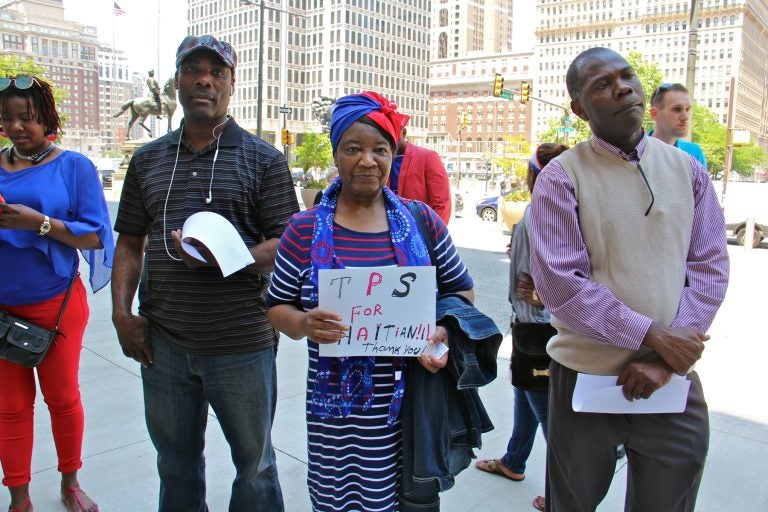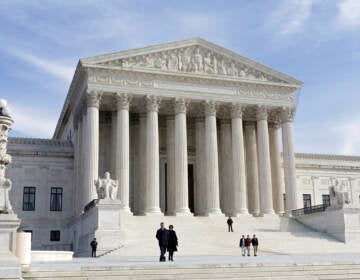With protected status ending in 2019, Haitians in the Philadelphia region weigh tough options
Listen 3:02
Marie Belfort (center) and other Haitian Philadelphians gather outside City Hall to celebrate Haitian Flag Day on May 18 and call for an extension of Temporary Protected Status for Haitians, which the Trump administration has now ended. TPS allowed Haitians to remain and work legally in the United States. (Emma Lee/WHYY)
On Monday, the Trump Administration announced it will end a program that protects an estimated 4,800 Haitians in New Jersey and Pennsylvania from deportation.
The last six months have been a roller coaster for the nation’s 58,000 Haitians with Temporary Protected Status who want to stay in the U.S.
“I will cry myself to sleep. I will wait until they arrest me,” said Haitian immigrant Ketty Etienne in May, when the Department of Homeland Security renewed TPS for what then-department secretary John Kelly said would be the final time. Monday’s decision finalized termination.
Etienne, a nurse’s aide in her late 30s, dreams of sending her children to magnet schools in Philadelphia, and just maybe, to Ivy League colleges. Her two youngest children are U.S. citizens, and she attends nursing school part time.
Waiting for Monday’s decision, Etienne had moved on from her despair, to something like hope.
“They’re not gonna end that thing. It’s not what God wants,” she said.
Then, Acting Homeland Security Secretary Elaine Duke announced TPS will end.
Devastating earthquake
The U.S. government awarded Temporary Protected Status to Haitians after a devastating earthquake in 2010. The designation blocks immigrants from being deported to countries with unsafe conditions, namely a civil war or natural disaster.
“Those extraordinary but temporary conditions caused by the 2010 earthquake no longer exist,” said Duke, in a press release issued by DHS. “Thus, under the applicable statute, the current TPS designation must be terminated.” Proponents of ending the program for Haitians, which according to the Washington Post include Secretary of State Rex Tillerson, say it should not be extended as an indefinite shield to immigrants who had been living in the U.S. illegally.
Without that protection, Haitians may revert to living in the country illegally, or take desperate measures to qualify for other forms of legal residency, said Philadelphia immigration attorney Desiree Wayne, who has about three dozen clients from Haiti with TPS.
“People will be rushing into marriages perhaps that they had not really thought through,” or filing petitions for distant family members, she said.
Others have simply fled.
“Some of [my congregants] went to Canada. But they contact me. They want to come back,” said Pastor Miguel Pierre of Sentinelle Fellowship Church in North Philadelphia. Over the past couple of weeks, five local Haitian community leaders and immigration attorneys have shared versions of the same story with WHYY. Their friends and congregants joined the thousands of Haitians in the U.S. who crossed the border into Canada in 2017.
Canadian officials blamed misinformation in Haitian social networks for the wave, saying its no easier to qualify for legal residency there than it is in the United States. Haitians with family in Canada may be eligible to stay, as are those who qualify for asylum based in repression or discrimination in their home country. Both are not guaranteed, and involve time-consuming immigration processes.
Multiple disasters after the quake
On Monday night, “I was not in a good spirit,” said Steve Paul, a Haitian-American in Philadelphia councilwoman Helen Gym’s office.
Paul said he sends an uncle in Haiti money every month. “He immediately texted me, ‘It’s going to get worse for me.'”
That uncle is one of thousands of Haitians who depend on money wired from family members who left, some $1.3 billion in 2015 according to the Pew Research Center.
In Haiti, “Folks are thinking, ‘Where is my money going to come from? How am I going to eat?’,” said Paul, who like many Haitians said the country cannot absorb tens of thousands of new residents. Since the 2010 earthquake, at least two major hurricanes and a cholera outbreak have wreaked havoc on infrastructure and killed many more people.
In its decision to end Haitian TPS — the U.S. Department of Homeland Security did give one reprieve — an extra 18 months to wind down the program. Paul said the community plans to use that time to pressure congress.
“We want our congressional leaders to actually put folks on TPS a path to permanent residency,” he said.
They’re starting Wednesday morning at Philadelphia City Hall.
WHYY is your source for fact-based, in-depth journalism and information. As a nonprofit organization, we rely on financial support from readers like you. Please give today.




